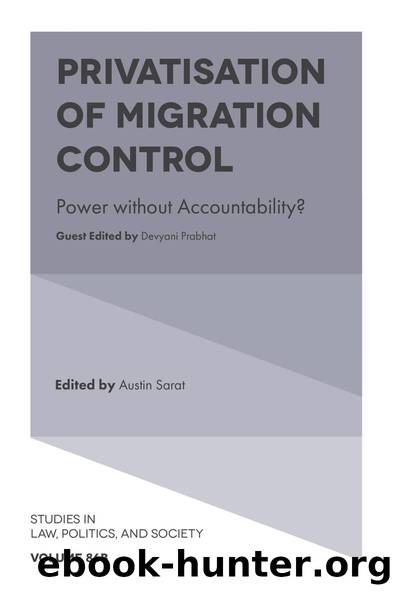Privatization of Migration Control by Austin Sarat

Author:Austin Sarat [Sarat, Austin]
Language: eng
Format: epub
ISBN: 9781801172455
Barnesnoble:
Publisher: Emerald Publishing Limited
Published: 2021-07-29T00:00:00+00:00
5.4. Psychological Exclusion
Systematic exclusion psychologically impacts irregular migrants, particularly regarding self-worth: the dehumanisation becomes internalised. Valentine (2010) particularly links the regime with â[t]he shame of no longer being able to support the family at home, [which] can contribute to depression and anxietyâ (p. 44). Similarly, Khosravi (2007) interestingly advances the point in his reflective article: âthe illegal migrant, subjected to a gaze and treatment that divests him or her of humanity, internalises the shameâ equating irregular status with âpersonal deficiencies and inadequaciesâ (p. 331).
An intriguing parallel can be drawn to Agambenâs camp dehumanisation theory, where inhabitants are âstripped of every political status and wholly reduced to bare lifeâ which results in individuals âfrom whom humiliation, horror, and fear had so taken away all consciousness and all personalityâ (Agamben, 1998, p. 171 & 185). Similarities exist between Agambenâs camp inhabitants, who are degraded and dehumanised to breaking point, and irregular migrants who are likewise dehumanised, stripped of rights, and subsequently excluded. Even when not held in camps, dehumanisation psychologically damages irregular migrants in a way that distorts self-perception. One of Bawdonâs (2014) interviewees encapsulates such self-depreciation: â[i]f the state says you have no status ⦠[y]ou are absolutely nobody. You canât stand up and speakâ (p. 30). Irregular migrants can become so degraded and distraught that they do not value themselves properly, which leads to issues of modern slavery including forced labour.22
This unsavoury phenomenon is illustrated by the Vietnamese women enslaved in nail bars across the UK. For instance, one newspaper reported two undocumented Vietnamese girls working â60 hours a weekâ in a nail bar, in which â[o]ne was being paid about £30 a month while the second was not paidâ (Morris, 2018). Dwyer et al. (2011) correctly highlight the link between irregular status and forced labour, explaining that â[w]ith few legal rights to residence, work or welfare, irregular migrants are likely to be the group most vulnerable to forced labourâ (p. 16). But it is not just the legal exclusion of irregular migrants that makes them especially vulnerable. As Caroline Haughey QC rightly notes in response to questioning a forced labour victim, â[the victimâs] view of herself is that she doesnât matterâ (as included in BBC, 2018, at 46:59). The ethnocentric dehumanisation the employer sanctions contribute to is internalised by the irregular migrant, leading to feelings of inferiority and irrelevancy. Unsurprisingly the Modern Slavery Helpline identified modern slavery âis normally more prevalent among the more vulnerable or within ⦠socially excluded groupsâ (Modern Slavery Helpline, publication date unavailable, p. 18), indicating the exacerbated exclusion caused by employer sanctions facilitates exploitation.
Ironically, modern slavery victims often become trapped in the UK in an excluded underclass. The hostile environment means many victims feel so invisible and isolated they cannot reach out for help, and thus have no alternative but to stay with their captors, encapsulated by Caroline Haughey QC as âincarceration by lack of choice, because there is no alternativeâ (as included in BBC, 2018, at 25:45). Ultimately therefore, the hostile environment traps the most vulnerable in the UK, subverting its purpose of encouraging voluntary deportation.
Download
This site does not store any files on its server. We only index and link to content provided by other sites. Please contact the content providers to delete copyright contents if any and email us, we'll remove relevant links or contents immediately.
| Antitrust | Civil Law |
| Emigration & Immigration | Federal Jurisdiction |
| Housing & Urban Development | Indigenous Peoples |
| Land Use | Public |
| Public Contract | Public Utilities |
| Urban, State & Local Government |
Machine Learning at Scale with H2O by Gregory Keys | David Whiting(4280)
Killers of the Flower Moon by David Grann(4022)
Oathbringer (The Stormlight Archive, Book 3) by Brandon Sanderson(3106)
Will by Will Smith(2890)
Once Upon a Broken Heart by Stephanie Garber(2817)
Guns, Germs and Steel by Diamond Jared(2350)
It Starts With Us (It Ends with Us #2) by Colleen Hoover(2316)
Borders by unknow(2296)
Friends, Lovers, and the Big Terrible Thing by Matthew Perry(2208)
The Room Where It Happened by John Bolton;(2140)
The Color of Law by Richard Rothstein(1911)
The Strength In Our Scars by Bianca Sparacino(1828)
HBR's 10 Must Reads 2022 by Harvard Business Review(1828)
A Short History of War by Jeremy Black(1827)
A Game of Thrones (The Illustrated Edition) by George R. R. Martin(1691)
Water Rights and the Environment in the United States by John Burch(1670)
515945210 by Unknown(1653)
Examples & Explanations: Administrative Law by William F. Funk & Richard H. Seamon(1627)
That Every Man Be Armed by Stephen P. Halbrook(1569)
